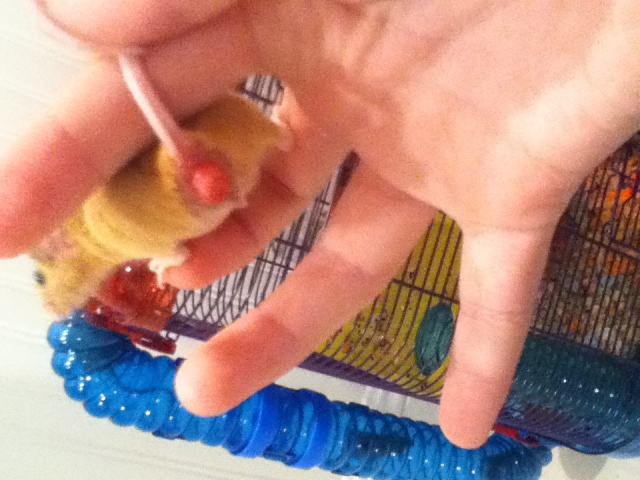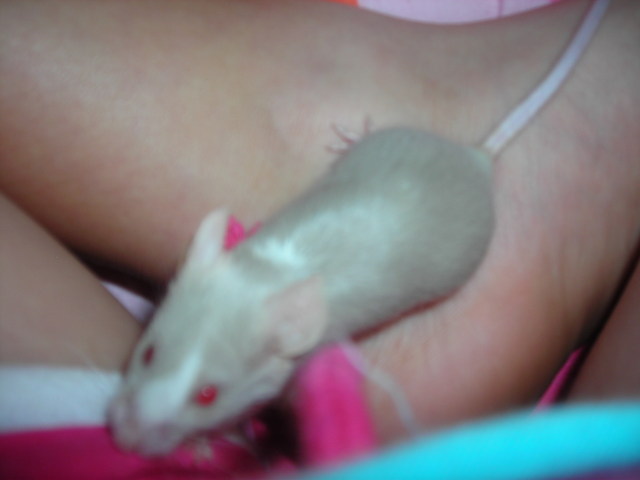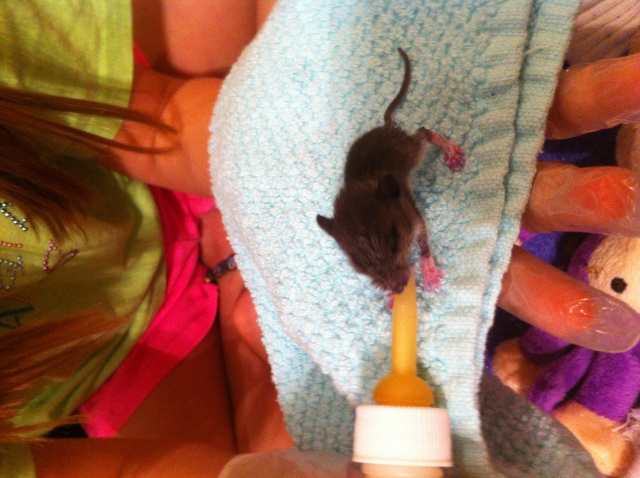QuestionQUESTION: Hi, I have two fancy mice, about a 18 months old. One has developed a red sore and lost fur on back and back of neck and behind ears and is constantly itching and scratching. I don't think it is mites because the other mouse is in perfect condition. Could this be an excema or self-barbouring do you think? Any ideas what I could do? Thanks
ANSWER: Dear Trudy,
Mice always have a few mites, but don't show signs of them until their immune system is somewhat compromised due to illness, age, stress, depression, or exposure to another source of mites. This means your second mouse is in danger of having a problem with mites but hasn't manifested them yet. Both mice need to be treated.
This person had the exact same situation as you do, so I'll just link you to that answer:
http://en.allexperts.com/q/Mice-3824/2010/3/Itchy-Mouse-treating-mites.htm
Let me know if you have any more questions.
squeaks,
Natasha
---------- FOLLOW-UP ----------
QUESTION: Thanks for your quick response. The mice are treated with mite spray weekly, though there were a few weeks when my husband was cleaning out and forgot! Is there anything I can do to soothe my little mouse and make it less sore in the meantime? If it doesn't get better could it be ringworm?
Thanks
Trudy
AnswerDear Trudy,
Besides mites, fur loss and itching can mean ringworm, some form of mange, or allergy. I'm not a vet, and don't have the mouse in front of me, so I can't be sure these are the only possibilities, nor can I diagnose it. If it's an allergy the scratching would precede the redness, whereas if it is a skin condition, the redness would probably come first, but you probably didn't notice which one came first. Ringworm can be diagnosed by the vet with a black light.
Let's examine the allergy component, which is something you can deal with at home. An allergy could be to a new substance or the sudden development of a reaction to a familiar one. Has anything changed in or near the cage recently? New food, new bedding, hair spray, air freshener, furniture polish, anything?
Second, you might think the mouse wouldn't suddenly develop allergies at this late age. In people, however, this can happen. The following is from my knowledge of people allergies-- since mice are used to study people health, they are likely very similar. First, allergies can be developed by overexposure to a substance. This is why so many cat lovers are allergic to cats. Growing up with cats exposes them to cats enough that they develop the allergy. Thus I am now allergic to mice and cats (a couple of 24-hour Loratadine a day make it possible for me to continue to enjoy my pets). This goes for foods too. I developed allergies to both garlic and rosemary from overexposure, one over a period of time and one from overexposure within one rosemary-packed week(!) The second way an allergy can be developed is simply due to age. There are ages at which allergies are likely to appear and disappear. With people it is about around ages 5-7, 10-12, 18-21, mid-thirties, and probably later too. I developed very severe hay fever very suddenly at age 21. And my cat allergy suddenly became manageable in my late 30s. You can tell why I know about allergies!! So mice may have cycles during their lives as well.
So, what to do about allergies? You need to identify the substance that is causing the problem. The most obvious is the bedding. Simply try another type of bedding. More complicated would be a food allergy. The most common food allergies in mice are to corn and sunflower seeds. Try removing these. If after two days the problem doesn't improve at all, you can be more drastic and choose one food to give the mouse alone. If the allergy remains, try a different one. It's unlikely the mouse will happen to be allergic to both substances, so if that doesn't work, it's probably not an allergy. If the allergy does disappear, however, then you can introduce each food separately one by one every two days, until you find the culprit. If the symptoms don't disappear, it's very likely not an allergy.
Because the above is time-consuming, it's best to rule out other obvious possibilities first. The best bet is of course to go to the vet. If you really can't, you can try treating for ringworm or other fungus at home. I would do this before testing for allergies, since that can be time-consuming. I have never treated mice for fungus myself, but other mouse people have used a very small amount of anti-fungal cream such as that prepared for athlete's foot. Choose the remedy with the fewest ingredients. Do NOT use tea tree oil unless you are sure someone else has used it with success on a mouse without hurting the mouse. I don't trust it, and it's easy to hurt a mouse's skin. The same especially for oil of primrose for mites, by the way, even though I have heard of it being used. I unknowingly tortured a mouse almost to death with primrose oil, on some very bad advice, and I don't know how to make it less noxious.
I truly hope this advice suffices to alleviate the problem. Really the mouse should go to the vet. Please let me know what happens. Really, please do! It will help me to give advice about future mice. I beg you! Most people ignore this request... and good luck.
squeaks,
Natasha

 My mice wont stop scratching herself
QuestionThis is brownie in her
QUESTION: Hello N
My mice wont stop scratching herself
QuestionThis is brownie in her
QUESTION: Hello N
 weird bump after female gave birth
Question
bump on mouse butt
One of my female mic
weird bump after female gave birth
Question
bump on mouse butt
One of my female mic
 pees
QuestionQUESTION: Hi Jedediah,
I have a fancy female m
pees
QuestionQUESTION: Hi Jedediah,
I have a fancy female m
 Orphan baby deer mouse and hantavirus
QuestionQUESTION: My cat had this baby mouse so i took
Orphan baby deer mouse and hantavirus
QuestionQUESTION: My cat had this baby mouse so i took
 question about my pet feeder mouse
Question
otacon otacons new bed
so i got a
question about my pet feeder mouse
Question
otacon otacons new bed
so i got a